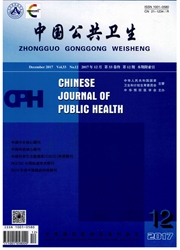

 中文摘要:
中文摘要:
目的了解老年人生活方式与轻度认知功能损害(MCI)的关系,为采取干预措施提供参考依据。方法按照1∶1病例对照研究方法,对在浙江省湖州市分层整群随机抽取的117例MCI病例组和117名健康对照组≥60周岁老年人进行面访调查。结果病例组与对照组老年人生活方式比较,病例组老年人体育锻炼〈1年、饮食随意、从不食用保健品、从不做家务、无业余爱好的比例分别为91.45%、94.02%、66.67%、12.82%、91.45%,均高于对照组老年人的68.38%、64.10%、33.33%、5.98%、74.36%,差异均有统计学意义(P〈0.01);多因素logistic回归分析结果表明,体育锻炼≥4年、注意饮食、经常食用保健品、经常做家务、有业余爱好是老年人MCI的保护因素。结论体育锻炼、饮食状况、食用保健品、做家务和有无业余爱好情况是老年人MCI的影响因素。
 英文摘要:
英文摘要:
Objective To examine the relationship between mild cognitive impairment(MCT) and life habits,and to provide evidence for intervention on the disease.Methods Stratified random cluster sampling was used and a case-control study including 117 MCI patients and 117 cognitive normal controls was conducted.Results The results of univariate analysis and multivariate analysis were consistent.Physical exercise,healthy diet,consumption of health products,doing housework,and hobby were significantly related to MCI.Conclusion Physical exercise,healthy diet,consumption of health products,doing housework and hobby are protective factor of MCI.
 同期刊论文项目
同期刊论文项目
 同项目期刊论文
同项目期刊论文
 期刊信息
期刊信息
